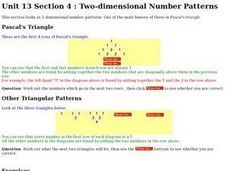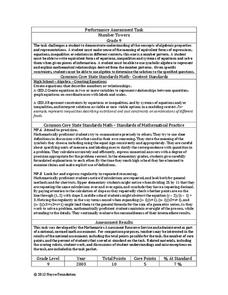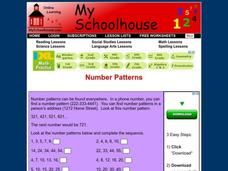Curated OER
Two-dimensional Number Patterns
In this online two-dimensional number patterns worksheet, students solve eight in-depth two-dimensional number patterns. Students check their answers as they go.
Curated OER
Number Patterns
These patterns are perfect for learners brand new to counting. They examine 9 number sequences, completing the last two numbers. The codes are easy to crack here- they count by 1, 2, and 3. For a bonus sequence, scholars count by 10....
Curated OER
Multiplies of 9 #2
Reinforce the multiplying by nine as a number pattern. After completing sequences of the multiples of nine, pupils decipher a pattern in the entire nine times tables. Finally, they write down any patterns that they see. A great way to...
Willow Tree
Patterns - Numbers, Shapes, etc.
Find the pattern is the name of the game! Learners examine different patterns represented by numbers, shapes, and words. They must describe the pattern, predict the result in a given position, and find an equation that represents a...
Inside Mathematics
Number Towers
Number towers use addition or multiplication to ensure each level is equal. While this is common in factoring, it is often not used with algebraic equations. Solving these six questions relies on problem solving skills and being able to...
Curated OER
Number Patterns
In this online interactive number patterns worksheet, students read examples and use their problem solving skills in order to solve to 22 problems that require them to complete number sequences.
Balanced Assessment
Pick a Pattern or Two
Math is all about finding patterns. In this ask, scholars first investigate a sequence formed by squaring the sum of the digits in the previous term. They go on to investigate a second sequence and write an algebraic expression for this...
Curated OER
Problem Solving Strategy: Use a Pattern
Pattern recognition is a skills that can help learners problem solve and build number sense. This simple worksheet requires kids to compete 5 number patterns.
Curated OER
Ordering
Four sequences are missing some numbers; can your scholars fill them in? These aviation-themed number sequences require skip counting and counting backward. Beside each pattern learners can reference a jumbled set of numbers inside a...
Illustrative Mathematics
Multiples of Nine
Which numbers are multiples of 9? Task class members to find the first ten multiples of 9 in a straightforward assessment learning exercise.
Inside Mathematics
Conference Tables
Pupils analyze a pattern of conference tables to determine the number of tables needed and the number of people that can be seated for a given size. Individuals develop general formulas for the two growing number patterns and use them to...
Curated OER
Multiplication Sequences
In this math worksheet, students learn that a sequence is a set of numbers which follows a mathematical rule. Students look at math sequences and fill in the missing numbers and also explain in words what the pattern is. Some of the...
University of Utah
Statistics-Investigate Patterns of Association in Bivariate Data
Young mathematicians construct and analyze patterns of association in bivariate data using scatter plots and linear models. The sixth chapter of a 10-part eighth grade workbook series then prompts class members to construct and interpret...
Curated OER
Identifying Patterns
Although this fractions exercise may seem difficult at first, it's really quite simple and intended for beginners to mixed numbers. Scholars complete 15 number sequences by adding two or three mixed numbers or decimal numbers. However,...
Curated OER
Patterns of 2s, 5s, and 10s
In order to connect the dots in three images youngsters skip count by twos, fives, and 10s. Encourage them to look for patterns as work, and consider giving out hundreds charts for guidance. They can also color these in once finished!
Curated OER
Odd One Out
Which of these pictures doesn't belong? Based on the first picture in each row, learners circle the picture that doesn't rhyme with it. Then, they get printing practice with rhyming CVC words pie and cry by tracing an outline. They focus...
Curated OER
Fibonacci and the Golden Number!
In this math patterns worksheet, students review the beginning numbers in Fibonacci's numbers, find the pattern, follow directions and problem solve to find the Golden Number and complete a chart, measure lengths of body parts and find...
Houghton Mifflin Harcourt
Graphs from Patterns
Fifth graders analyze patterns and begin looking at function tables. This is a pertinent preparation for graphing patterns. In fact, consider giving your class a piece of graph paper and then teach them how!
Curated OER
I See A Pattern
For this number pattern worksheet, learners find the total of 5 addition problems and tell what pattern they see. They complete 3 number patterns and create a number pattern of their own.
K12 Reader
Extending Patterns
2, 4, 6, 8. What comes next? This reading comprehension learning exercise discusses patterns and extending patterns. After reading the short article, kids answer a series of questions to demonstrate their understanding of the passage.
Balanced Assessment
Stick Patterns
Sticks and stones may break my bones, but these sticks will make me smarter. Pupils examine arrays of sticks to determine the next array in a pattern. They use the number of sticks added to each previous array to determine a recursive...
Balanced Assessment
Dot Patterns
Use geometric patterns to teach your class how to write functions. The assessment task has scholars consider a pattern of dots to draw the next picture of the pattern. Pupils then analyze the pattern, which helps them develop a function...
Oregon Department of Education
Building Number Sense
It's never too early to begin a child's math education. This collection of fun hands-on activities engage youngsters in building their number sense as they learn how to count objects, identify numerals, compare amounts, and much more.
Curated OER
Look for Patterns
In this number pattern worksheet, 3rd graders focus on sequencing. Students must study the number chart and respond to 3 short answer questions about the patterns that are shown in the chart.

























